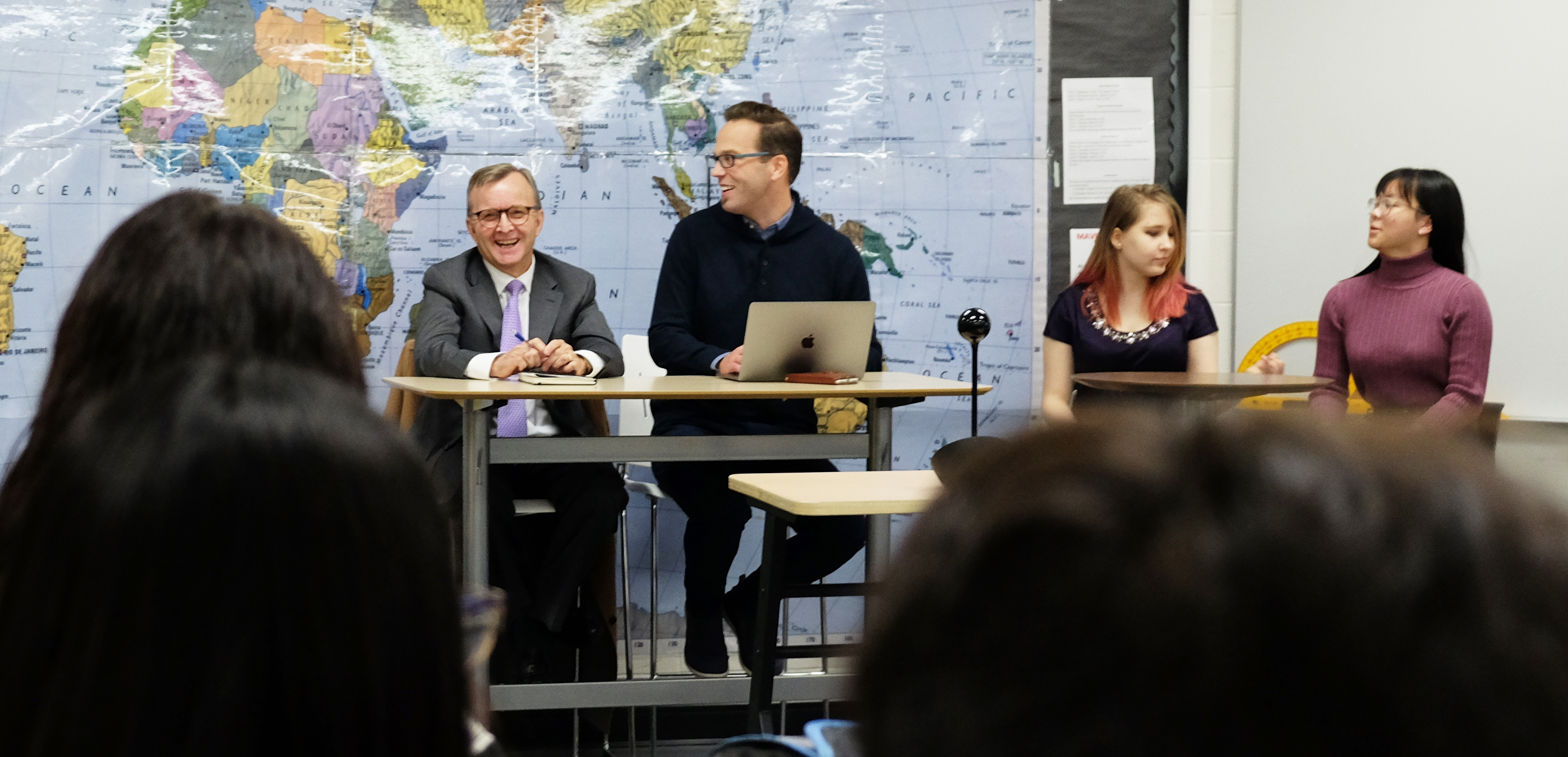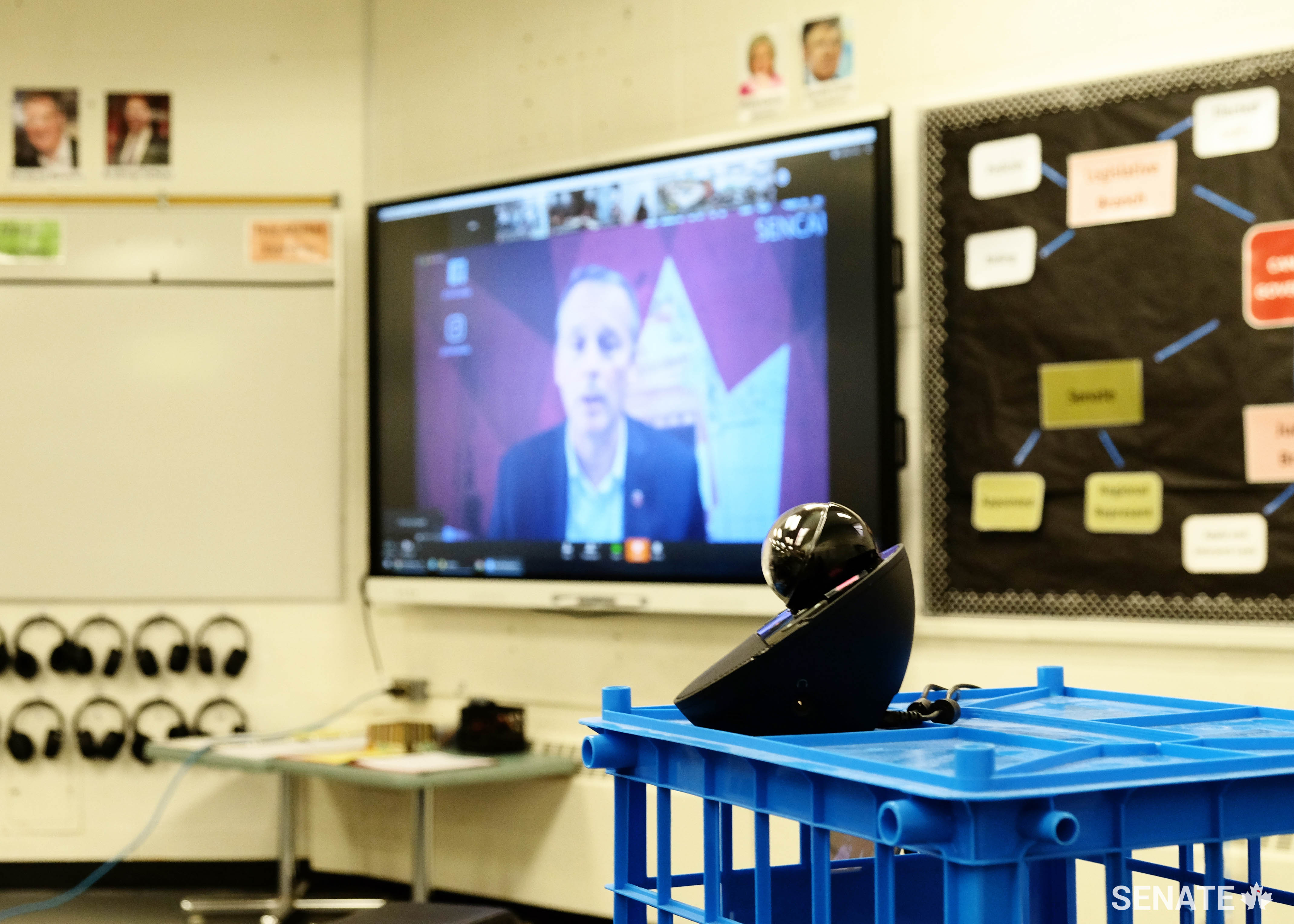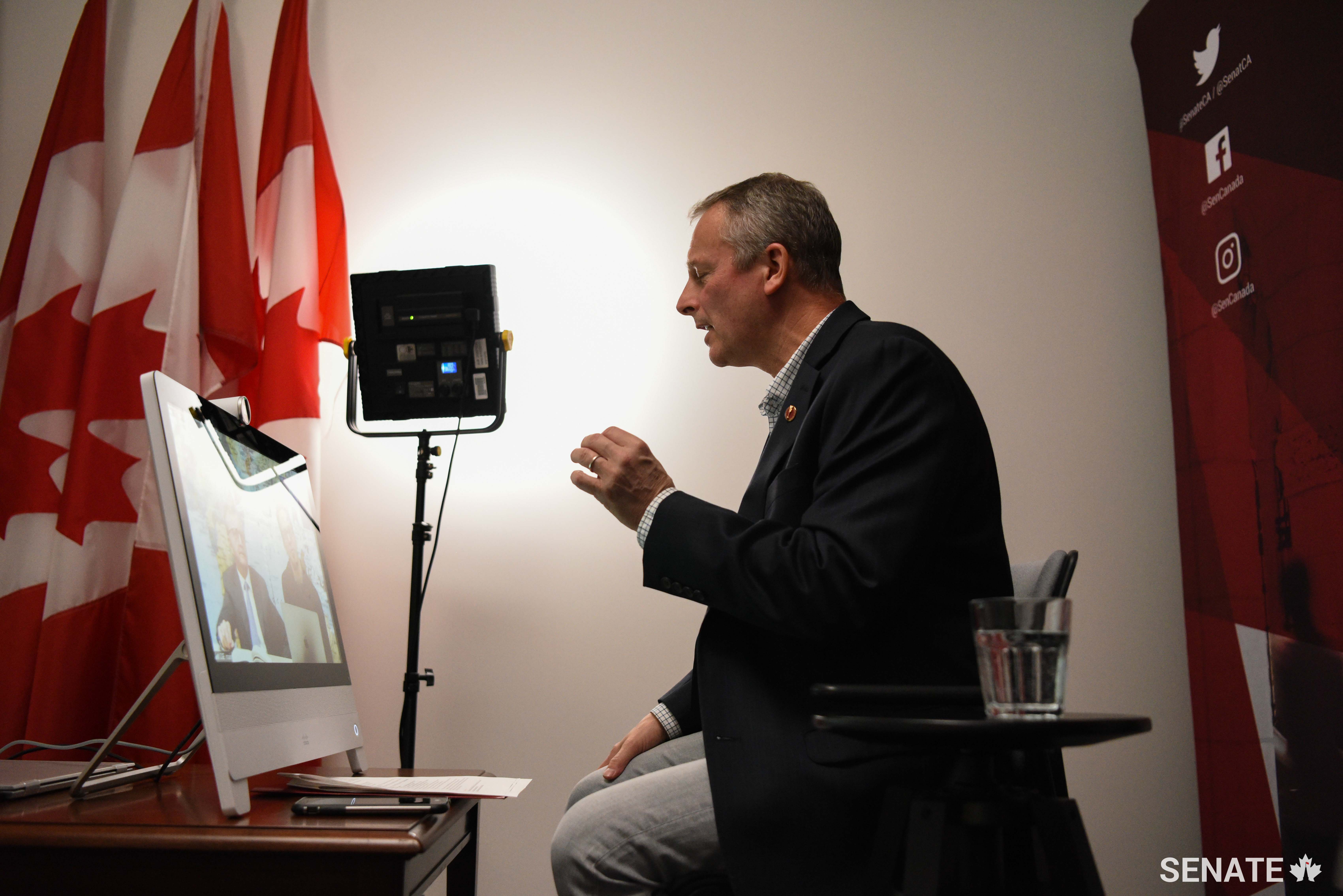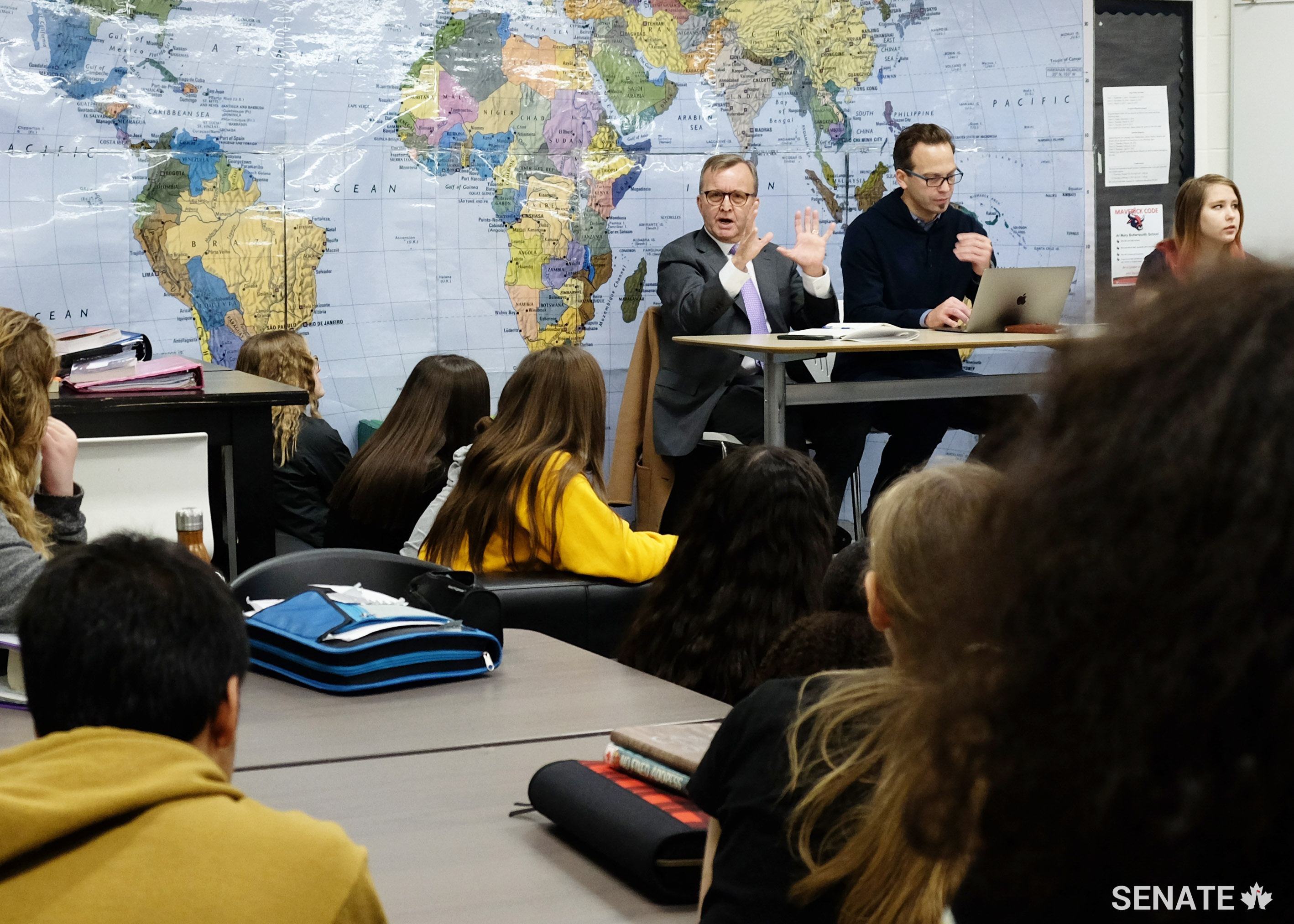Video magic connects senators with students in four provinces

“Yo!”
This decidedly unparliamentary greeting caused senators Grant Mitchell and David Wells to smile.
It was an entirely different experience for these Parliament Hill veterans to take smart questions from a high school student in a Deadpool hoodie.
The teen’s question cut right to the heart of a debate that continues to take place in the Senate — does party affiliation affect senators’ commitment to sober second thought?
Senator Mitchell, who has no formal party affiliation but who helps to guide government legislation through the Senate as part of the Government Representative Office, said an increase in senators who don’t belong to political caucuses makes the Senate “different and complementary” to the House of Commons.

Senator Wells, who is a member of the Conservative caucus, said he comes to his own conclusions about how to vote.
“I’m more concerned with what’s right for my country and what’s right for my province,” the Newfoundland and Labrador senator said. “I’m an independent-minded senator.”
The two senators were taking part in video meetup with high school students in four provinces that was set up by the Centre for Global Education. All told, about 50 students took part.
Senator Mitchell sat with moderator and centre executive director Terry Godwaldt at Mary Butterworth School in Edmonton, while Senator Wells fielded questions from the Senate’s small Ottawa studio.
The centre’s videoconferencing technology brought them all together, along with students from Regina’s F.W. Johnson Collegiate, Montreal’s Trafalgar School for Girls and Saint John’s St. Malachy’s Memorial High School.
Though the two senators often find themselves on the opposite sides of issues being debated in the Red Chamber, that didn’t stop them from showing genuine mutual respect and collegiality — hallmarks of the Senate at its best.
“The Senate is a really remarkable and special place,” Senator Mitchell said. “If the prime minister ever asks you to serve in it, say yes.”
The questions came fast and furious — and students showed a keen understanding of current affairs.
An Edmonton student asked if the lack of Liberal MPs from Alberta and the rise of Western separatist sentiment will affect how senators do their jobs.
Senator Mitchell, an Albertan, said Alberta senators would step up and make the case for their province, “as we always do.”
Senator Wells noted that a similar phenomenon had taken place during the Conservatives’ 2011 federal election win — Conservatives had won plenty of Maritime ridings, but they had been unsuccessful in Newfoundland and Labrador that year.
“It did fall to the Conservative senators to do more of the heavy lifting,” he said. “It’s one more role that the Senate can play. We can bring that voice to the table.”
The one-hour event left Senator Wells impressed — and even a little envious.
“I’d trade places with them in a heartbeat,” he said.
“I’d rather have everything in front me — they get to start now.”


This is the second collaboration between the Senate’s youth outreach program, SENgage, and the Centre for Global Education. SENgage helps young people learn about the role of the Senate by connecting senators with students in elementary school, high school and university. The centre’s mission is to provide students with learning opportunities that are enhanced through technology and informed by sound research and innovative teaching.
Related articles
Tags
Committee news
Video magic connects senators with students in four provinces

“Yo!”
This decidedly unparliamentary greeting caused senators Grant Mitchell and David Wells to smile.
It was an entirely different experience for these Parliament Hill veterans to take smart questions from a high school student in a Deadpool hoodie.
The teen’s question cut right to the heart of a debate that continues to take place in the Senate — does party affiliation affect senators’ commitment to sober second thought?
Senator Mitchell, who has no formal party affiliation but who helps to guide government legislation through the Senate as part of the Government Representative Office, said an increase in senators who don’t belong to political caucuses makes the Senate “different and complementary” to the House of Commons.

Senator Wells, who is a member of the Conservative caucus, said he comes to his own conclusions about how to vote.
“I’m more concerned with what’s right for my country and what’s right for my province,” the Newfoundland and Labrador senator said. “I’m an independent-minded senator.”
The two senators were taking part in video meetup with high school students in four provinces that was set up by the Centre for Global Education. All told, about 50 students took part.
Senator Mitchell sat with moderator and centre executive director Terry Godwaldt at Mary Butterworth School in Edmonton, while Senator Wells fielded questions from the Senate’s small Ottawa studio.
The centre’s videoconferencing technology brought them all together, along with students from Regina’s F.W. Johnson Collegiate, Montreal’s Trafalgar School for Girls and Saint John’s St. Malachy’s Memorial High School.
Though the two senators often find themselves on the opposite sides of issues being debated in the Red Chamber, that didn’t stop them from showing genuine mutual respect and collegiality — hallmarks of the Senate at its best.
“The Senate is a really remarkable and special place,” Senator Mitchell said. “If the prime minister ever asks you to serve in it, say yes.”
The questions came fast and furious — and students showed a keen understanding of current affairs.
An Edmonton student asked if the lack of Liberal MPs from Alberta and the rise of Western separatist sentiment will affect how senators do their jobs.
Senator Mitchell, an Albertan, said Alberta senators would step up and make the case for their province, “as we always do.”
Senator Wells noted that a similar phenomenon had taken place during the Conservatives’ 2011 federal election win — Conservatives had won plenty of Maritime ridings, but they had been unsuccessful in Newfoundland and Labrador that year.
“It did fall to the Conservative senators to do more of the heavy lifting,” he said. “It’s one more role that the Senate can play. We can bring that voice to the table.”
The one-hour event left Senator Wells impressed — and even a little envious.
“I’d trade places with them in a heartbeat,” he said.
“I’d rather have everything in front me — they get to start now.”


This is the second collaboration between the Senate’s youth outreach program, SENgage, and the Centre for Global Education. SENgage helps young people learn about the role of the Senate by connecting senators with students in elementary school, high school and university. The centre’s mission is to provide students with learning opportunities that are enhanced through technology and informed by sound research and innovative teaching.


